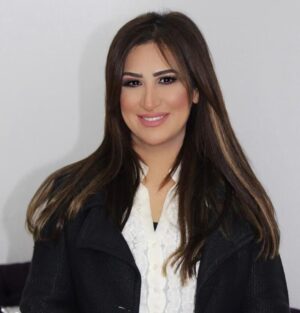Wider World
Bahraini Journalist Leading Advocate of Abraham Accords

As the head of the Bahraini Journalists Association, Ahdeya Ahmed Al-Sayed, 47, has been very public about supporting her country’s normalization with Israel, both before and after the Abraham Accords were signed in September 2020 at the White House. The agreement between Bahrain and Israel—and the one between the United Arab Emirates and Israel—marked the first official ties between an Arab country and Israel since the 1994 peace treaty with Jordan. (Since then, Morocco and Sudan have also established new relations with Israel.)
The veteran journalist and first woman to head the Bahraini media group plans to lead a group of Bahraini reporters on their first-ever trip to Israel this spring. Al-Sayed spoke in January to the American Jewish Press Association in a virtual conversation moderated by Sue Fishkoff, editor of J. The Jewish News of Northern California. This excerpt has been edited for clarity.
What has been the reaction to the Abraham Accords in Bahrain?
A lot of people said, “We never had a problem with Israel; the Abraham Accords just gave us an opportunity to start a relationship with a country that we never knew, with people we never knew.” But there are people in their 60s and 70s who have been raised on certain slogans, on certain emotions and are attached to certain issues. They do not want to understand the world has changed.
I personally felt that the day had come. As much as we want Palestinians to live in peace, we want Israelis to live in peace. If you’re speaking about human rights, then people are all equal. Whether one is a Palestinian mother or an Israeli mother, I don’t want anyone to be threatened with a rocket on their head.
You’ve been outspoken about the need for a relationship with Israel for years. What made you so adamant about standing up?
I think that if people continue to be followers, nothing can change. If you continue doing that, you will always stay where you are. I went through being bullied, being harassed on social media, being called names. I felt hurt, because I have three sons and a husband, and they don’t deserve to read these things about me. You start taking it lightly after a while because you think that you have bigger goals. You want your children and other people’s children to grow in a better world. I want my children to have friends in Israel. I want Israelis not to feel awkward when they are around Arab people. They are just like us. They are people who have families and want a good life. Why should your identity be a problem? I think the Abraham Accords ended that.
Bahrain’s leadership is Sunni Muslim, while the majority of the 1.4 million population is Shia. Does acceptance of normalization run along Shia-Sunni lines, especially considering the involvement of Shia neighbor Iran in Bahrain?
I cannot say that accepting the normalization is something divided among Sunnis and Shias, that Sunnis are accepting it and Shias are not. The majority of Shias in Bahrain are not loyal to Iran. It’s a complicated issue and many Shias proved—and did not even need to prove—that they were loyal to the regime here.
You have said you see similarities between Israel and Bahrain that make them natural allies and friends. What are they?
There are so many similarities. We are small countries, we have faced challenges. We faced our enemies. We proved to the world that we exist. We proved that we are capable of protecting ourselves. The people who are targeting our security, our stability, they are the same extremists and terrorist militias. Iran is a common enemy. But I don’t want people to have the impression that these agreements were signed because we have common enemies. These agreements, I personally believe, were signed because there was a willingness from both sides to start a friendship.
Maya Mirsky is a staff writer for J. The Jewish News of Northern California.










 Facebook
Facebook Instagram
Instagram Twitter
Twitter
Leave a Reply